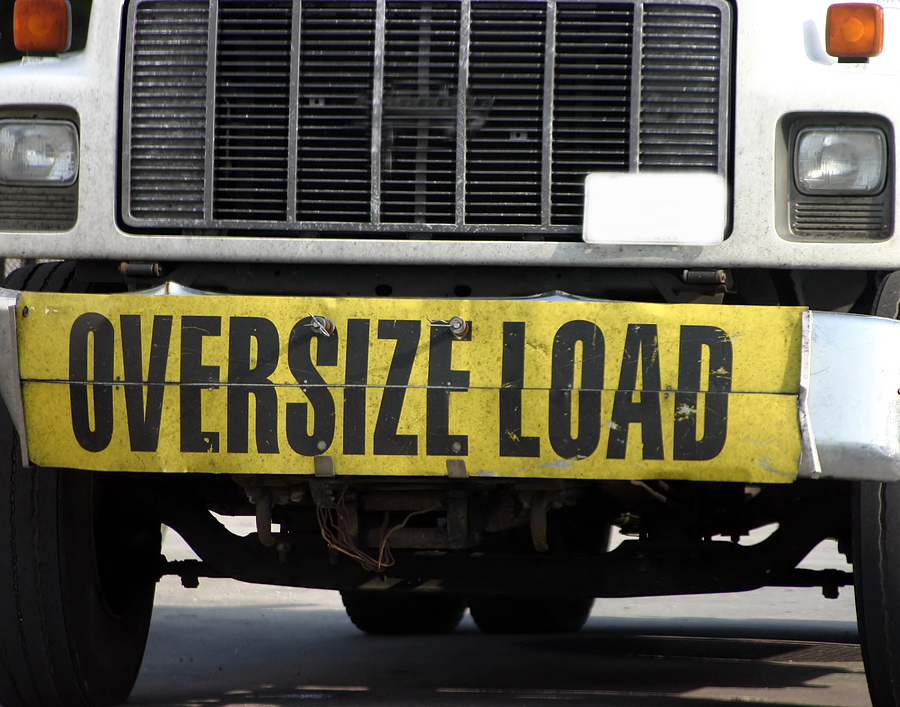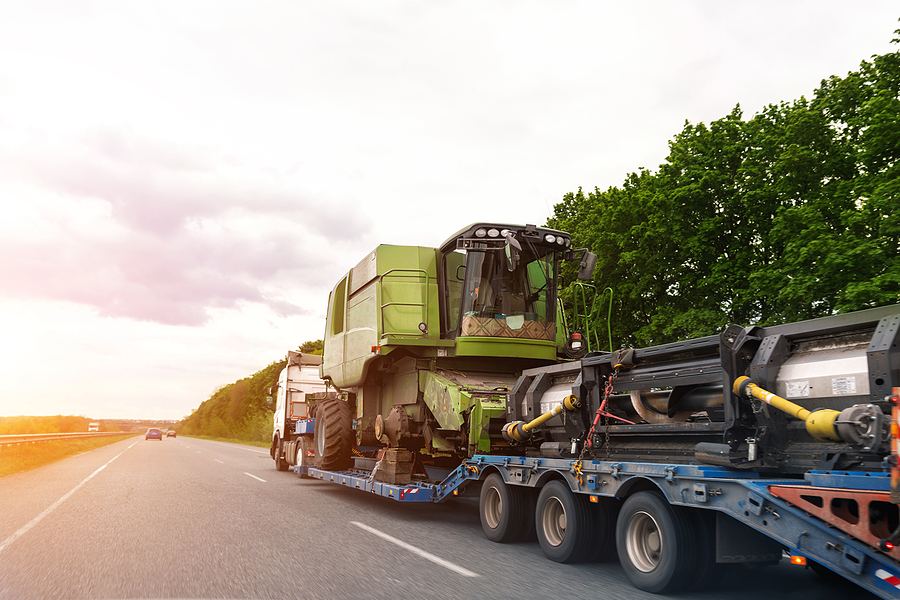Moving heavy equipment across Indiana requires more than just a powerful truck and determination. Whether you’re transporting construction machinery to a job site or relocating manufacturing equipment, understanding Indiana’s specific regulations for oversized loads can mean the difference between a smooth operation and costly delays.
Oversized load transport involves strict legal requirements, safety protocols, and logistical considerations that many business owners underestimate. Non-compliance doesn’t just result in fines—it can lead to permit revocation, vehicle impoundment, and significant project delays that impact your bottom line.
This comprehensive guide breaks down everything you need to know about transporting oversized loads in Indiana, from obtaining the right permits to navigating common challenges that arise during transport.

What Qualifies as an Oversized Load in Indiana?
Indiana law defines oversized loads through specific dimensional and weight thresholds outlined in Indiana Code IC 9-20-3 and Indiana Administrative Code 105 IAC 7. Understanding these limits helps determine whether your cargo requires special permits and handling procedures.
A load becomes “oversized” when it exceeds standard legal dimensions:
- Width: Greater than 8 feet, 6 inches
- Height: Exceeding 13 feet, 6 inches
- Length: Over 65 feet for truck-trailer combinations
- Weight: Surpassing 80,000 pounds gross vehicle weight
Common examples of oversized loads include construction cranes, industrial machinery, prefabricated buildings, wind turbine components, and large agricultural equipment. Even seemingly manageable equipment can qualify as oversized when loaded onto transport trailers.
Heavy equipment transport often involves loads that exceed multiple dimensions simultaneously, requiring careful planning and specialized handling procedures.
Required Permits and Application Process
Transporting oversized loads legally requires obtaining proper permits from the Indiana Department of Transportation (INDOT). The permit system ensures road safety and infrastructure protection while allowing necessary commercial transport.
Types of Permits Available
- Single Trip Permits cover one-time movements and remain the most common choice for businesses with occasional transport needs. These permits specify exact routes, travel times, and load specifications.
- Annual Permits benefit companies regularly transporting oversized loads within Indiana. While more expensive initially, they provide flexibility and cost savings for frequent haulers.
- Blanket Permits apply to specific load types transported regularly along established routes, streamlining the process for qualifying businesses.
Application Requirements
The permit application process requires detailed information about your load, vehicle, and intended route. Essential documentation includes:
- Load dimensions and weight specifications
- Vehicle and trailer details
- Proposed travel route and timing
- Insurance documentation
- Driver qualifications and certifications
Applications must be submitted at least 48 hours before transport, though complex loads may require longer processing times. Rush permits are available for emergency situations but come with additional fees.
Safety Requirements and Best Practices
Indiana enforces strict safety regulations for oversized load towing service operations. These requirements protect both the transport crew and other road users while minimizing infrastructure damage.
Escort Vehicle Requirements
Loads exceeding certain dimensions require professional escort vehicles with trained operators. Requirements vary based on load size:
- Width over 12 feet: Front escort required
- Width over 14 feet: Front and rear escorts required
- Length over 100 feet: Additional escort requirements may apply
Escort vehicles must display proper warning signs, amber lighting, and maintain radio communication with the transport vehicle.
Required Signage and Equipment
All oversized load transport must display appropriate warning signs and safety equipment. Standard requirements include:
- “OVERSIZE LOAD” signs on front and rear of the transport vehicle
- Amber rotating or flashing lights
- Red flags on extremities extending beyond normal vehicle width
- Reflective tape or markings for enhanced visibility
Time and Route Restrictions
Indiana restricts oversized load movement during certain periods and on specific routes. Common restrictions include:
- Weekend limitations: No movement during peak travel times
- Holiday restrictions: Complete prohibition during major holidays
- Weather conditions: Suspension during adverse weather
- Construction zones: Route modifications around active work areas
Local ordinances may impose additional restrictions, particularly in urban areas or on bridges with weight limitations.
Common Challenges and Solutions
Even with proper permits and preparation, transporting heavy equipment presents unique challenges that experienced operators learn to navigate effectively.
Infrastructure Limitations
Bridge weight limits, overhead clearances, and road conditions create routing challenges. Professional transport companies maintain detailed route databases and conduct pre-transport surveys to identify potential obstacles.
When standard routes prove unsuitable, alternative paths may add significant distance and time to transport schedules. Planning contingencies helps minimize project delays.
Weather-Related Delays
Indiana’s variable weather conditions significantly impact oversized load transport. High winds can make wide loads dangerous to transport, while rain and snow affect visibility and road conditions.
Successful transport companies monitor weather forecasts closely and maintain flexible scheduling to accommodate necessary delays. Attempting transport in marginal conditions increases accident risk and potential liability.
Traffic and Timing Coordination
Coordinating oversized load movement with regular traffic requires careful timing and communication. Many permits restrict transport to off-peak hours, requiring early morning or weekend scheduling.
Construction zones and special events can disrupt planned routes, necessitating real-time adjustments and communication with authorities.
Contact Us for Heavy Duty Towing and Transport! ✅
Penalties for Non-Compliance
Indiana enforces oversized load regulations strictly, with penalties designed to ensure compliance and protect infrastructure integrity.
- Financial penalties for violations range from hundreds to thousands of dollars, depending on the severity and nature of the offense. Repeat violations face escalating fine structures.
- Permit revocation represents a serious consequence that can halt business operations. Companies with revoked permits must demonstrate corrected procedures before receiving new permits.
- Vehicle impoundment occurs when violations pose immediate safety risks or involve gross non-compliance. Impounded vehicles remain out of service until all violations are resolved and associated fees paid.
- Criminal charges may apply in cases involving gross negligence, falsified documentation, or repeated serious violations. Such charges can result in personal liability for company officers.
- Infrastructure damage liability holds violators responsible for repair costs when oversized loads damage roads, bridges, or other public infrastructure. These costs can reach hundreds of thousands of dollars for major infrastructure repairs.
Frequently Asked Questions
What is the maximum height and width allowed for oversized loads in Indiana without a permit?
Standard legal limits are 8 feet, 6 inches width and 13 feet, 6 inches height. Loads exceeding these dimensions require permits regardless of other factors.
How do weather conditions affect oversized load transport in Indiana?
High winds, precipitation, and visibility restrictions can halt transport operations. Permits may include weather-specific conditions that suspend transport during adverse conditions.
Are there any specific routes in Indiana that are restricted for oversized loads?
Yes, many routes have restrictions due to bridge weight limits, overhead clearances, or local ordinances. INDOT maintains current restriction databases, and permit applications undergo route analysis.
How can I find a reliable oversized load transport company in Indiana?
Look for companies with proper licensing, insurance coverage, safety records, and experience with your specific load type. References from similar businesses provide valuable insights.
What should I do if I encounter unexpected delays or issues during transport?
Contact the permit issuing authority immediately to report delays or route changes. Maintain communication with escort vehicles and follow established emergency procedures.
Are there seasonal restrictions for oversized loads in Indiana?
Some restrictions apply during peak agricultural seasons, construction periods, or holiday travel times. Permits specify any seasonal limitations affecting transport timing.
What types of insurance are required for transporting oversized loads?
Minimum insurance requirements vary based on load value and size. Most operations require commercial auto insurance, cargo coverage, and additional liability protection.
How far in advance should I apply for an oversized load permit?
Standard applications require 48-hour advance notice, but complex loads may need weeks of processing time. Early application prevents delays and allows route planning.
Conclusion
Successfully transporting oversized loads in Indiana requires thorough understanding of regulations, careful planning, and attention to safety requirements. The complexity of permit requirements, route restrictions, and safety protocols makes professional expertise valuable for most businesses.
Working with experienced heavy equipment towing services ensures compliance with all regulations while minimizing delays and liability risks. Professional transport companies maintain current knowledge of changing regulations, established relationships with permitting authorities, and specialized equipment for safe transport.
Ready to schedule your oversized load transport? Contact our experienced team today at 317-247-8484 for a consultation and detailed transport plan tailored to your specific requirements. We handle the complexities so you can focus on your core business operations.
Related Post: Heavy Equipment Transport Services: Your Complete Guide

